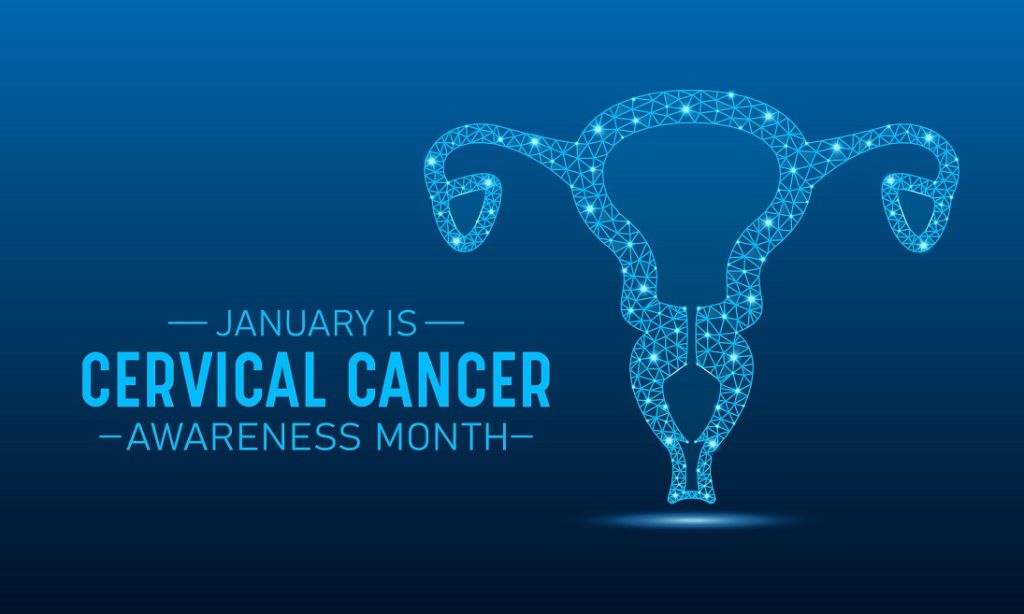
According to a survey, every 2 minutes, a woman dies of cervical cancer [1]. Cervical cancer is the second most frequent cancer among women in India and is also the most preventable cancer, which can be prevented by HPV or Human Papillomavirus vaccine. Every year, January is marked as the cervical cancer awareness month to emphasize the importance of early detection, treatment, and importance of HPV vaccination.
What is Cervical Cancer?
Cervical cancer develops in a woman’s cervix (the passage from the vagina to the uterus). The majority of cervical cancer cases (99%) are associated with the presence of high-risk human papillomaviruses (HPV), a prevalent virus often transmitted through sexual contact.
Although most infections with HPV resolve spontaneously and cause no symptoms, persistent infection can cause cervical cancer in women [2].
Timely identification of cancer-causing HPV types can help prevent cervical cancer.
Schedule Your Screening Today
4 Things You Must Know About HPV Vaccine
1. Early Protection Works Best
HPV vaccines can be given starting at age 9 years. Vaccination is recommended for girls aged between 9-14 before they become sexually active. However, all people ages 9 to 45 can get the HPV vaccine to protect against genital warts or different types of cancer caused by HPV.
The sooner you get it, the better the protection is therefore, it’s advisable to get the HPV vaccine sooner rather than later. It protects your child well before they come into contact with the virus.
Dosage Schedule:
-A 2-dose schedule is recommended for people who get the first dose before their 15th birthday. In a 2-dose series, the second dose should be given 6–12 months after the first dose (0, 6–12-month schedule).
-A 3-dose schedule is recommended for people who get the first dose on or after their 15th birthday and those with certain immunocompromising conditions. In a 3-dose series, the second dose should be given between 1-2 months after the first dose, and the third dose should be given 6 months after the first dose.
About 85% of people will get an HPV infection in their lifetime. Speak to an expert to know more about the vaccine schedule and dose best suited for you.
Connect To An Expert
2. The Vaccine Is Very Effective and Safe
The HPV vaccine is safe and effective at preventing HPV-related infections and cancers. In clinical trials, the efficacy of the HPV vaccine has exceeded 90% among women without prior HPV infection. This vaccine has been demonstrated to prevent HPV-related cancer, such as cervical cancer, genital warts, and various other cancers impacting critical areas like the cervix, anus, and vagina. They have also demonstrated high efficacy against anogenital warts among men [3].
Currently, there are three HPV vaccines available, each targeting different numbers of HPV types: the 9-valent HPV vaccine, quadrivalent HPV vaccine, and bivalent HPV vaccine. All three vaccines offer protection against HPV types 16 and 18, which are responsible for the majority of HPV-related cancers.
3. Protection Against Anal and Genital Warts
The HPV vaccine offers crucial protection against anal and genital warts, providing a shield against these common and distressing conditions. Genital warts are primarily caused by HPV-6 and HPV-11 strains, collectively in about 90% of the cases [4].
Although these strains are considered low risk because they do not lead to cancer, they still pose a common and bothersome issue for many individuals.
4. Can Also Be Taken By Sexually Active People
The best time to consider vaccination is before becoming sexually active and potentially exposed to HPV. However, even if you’re already sexually active, getting vaccinated can still provide benefits. More than 90 percent of sexually active men and 80 percent of sexually active women will be infected with HPV in their lifetime [5].
The vaccine covers many strains of HPV. Thus giving a good chance of protection.
Know more about HPV vaccines from your doctor. Find all your health needs at Tata 1mg, from vaccines to specialty medicines.
Explore Tata 1mg
Let’s take small steps toward a future where HPV-related illnesses are less prevalent, creating healthier communities worldwide.
Protecting Today, Empowering Tomorrow.
(The article is written by Simran Suri, Assistant Team Lead, and reviewed by Dr.Subita Alagh, Senior Executive)
References:
1. Gaffney DK, Hashibe M, Kepka D. Too many women are dying from cervix cancer. National Library Of Medicine.[Updated 2018].
https://pubmed.ncbi.nlm.nih.gov/30301561/
2. Overview. Cervical Cancer. World Health Organisation.
https://www.who.int/health-topics/cervical-cancer#tab=tab_1
3. HPV Vaccine Schedule and Dosing. Centers For Disease Control and Prevention. [Updated 2021].
https://www.cdc.gov/hpv/hcp/schedules-recommendations.html
4. Human Papillomavirus (HPV) Vaccines. National Cancer Institute. [Updated 2021].
https://www.cancer.gov/about-cancer/causes-prevention/risk/infectious-agents/hpv-vaccine-fact-sheet#r1
5. Quick Facts: HPV-Associated Cancer. Department of Health. [Updated 2021].
https://www.health.state.mn.us/data/mcrs/data/qfhpv.html#:~:text=More%20than%2090%20percent%20of,with%20HPV%20in%20their%20lifetime.&text=Around%2050%20percent%20of%20HPV,HPV%2C%20which%20can%20cause%20cancer.